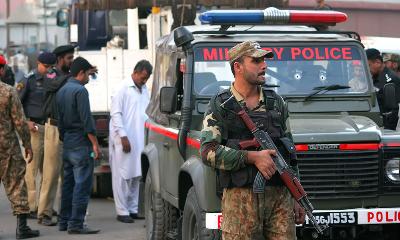Share
Human Rights Voices
While the UN devotes its human rights operations to the demonization of the democratic state of Israel above all others and condemns the United States more often than the vast majority of non-democracies around the world, the voices of real victims around the world must be heard.
Pakistan, September 26, 2024
Pakistan: Police blasphemy killings raise new concerns
Original source
Last week, Shah Nawaz, a 32-year-old doctor in Pakistan's Sindh province, was shot by police, who claimed he had resisted arrest after being accused of insulting Islam's Prophet Muhammad and sharing "blasphemous" content on social media.
Nawaz's family rejected the police's claims and said he was killed while in custody after surrendering to police. The family said authorities told him he would have a chance to prove his innocence.
It was the second such killing in a week. On September 12, a 52-year-old man in Balochistan province was killed while held in custody at a police station for blasphemy accusations.
The killings drew condemnation from the independent Human Rights Commission of Pakistan (HRCP), which said in a statement it was "gravely concerned by the alleged extrajudicial killing of two people accused of blasphemy."
"This pattern of violence in cases of blasphemy, in which law enforcement personnel are allegedly involved, is an alarming trend," the HRCP statement said.
A long-running problem in Pakistan
In religiously conservative Pakistan, speech considered insulting or criticizing Islam is punishable by death.
Although no one has ever been formally executed by the state under blasphemy laws, in dozens of cases, lynch mobs have killed those accused before a trial could take place.
Pakistan, in recent years, has witnessed a surge of blasphemy-related killings. In numerous cases, mere accusations have unleashed lynch mobs.
Last year, blasphemy accusations triggered mobs that attacked Christian neighborhoods in the eastern province of Punjab, burning several churches and displacing hundreds of people from their homes. Christians have said those involved in the violence have yet to be put on trial.
In 2011, a former governor of Punjab province, Salman Taseer, was murdered by his bodyguard over his support for reforming Pakistan's blasphemy laws.
"Such killings are the combination of religious intolerance, deeply influential religious forces, and the state being unwilling or unable to confront the problem," Michael Kugelman, a South Asia expert at the Washington-based Woodrow Wilson Center for Scholars, told DW.
In some cases, accusing someone of blasphemy can be used to settle personal scores, vendettas or to seize property.
"There is no need to go to court, just a public accusation of blasphemy will gather and incite vigilante mobs to lynch the accused, without waiting for any court case," Tahira Abdullah, a human rights activist, told DW.
Ruth Stephen, a Pakistani minority rights activist, told DW that accusing someone of blasphemy can be used "strategically to settle personal scores."
She added that the government of Pakistan "organizes and enables" religious extremists, which contributes to the problem of blasphemy killings.
Abdullah said a long-term solution would be for authorities to "review and amend the laws and procedures, which were tampered with illegally and unconstitutionally by unelected military dictator Zia-ul-Haq in the 1980s."
Can the government intervene?
The HRCP has demanded the government ensure an independent inquiry into the recent blasphemy deaths at the hands of police.
However, analyst Kugelman said that Islamist hardliners are "deeply influential" in Pakistani politics, and "civilian and military leaderships have been unwilling to antagonize them."
"We have seen throughout Pakistan's history that those who exploit blasphemy laws, and those who justify violence against alleged violators of those laws, are treated with kid gloves by the Pakistani state," Kugelman said.
Activist Stephen said that the international community should put pressure on Pakistan's government to take action against blasphemy killings, for example, with the threat of sanctions.
The US Commission on International Religious Freedom has regularly asserted that Pakistan is one of the world's strictest and most frequent enforcers of blasphemy laws.
However, analyst Kugelman said that he doesn't think the international community will go as far as enacting sanctions over blasphemy-related killings.
"But we've seen the problem repeatedly flagged by Western governments, including the US in its annual religious freedom reports. Of course, simply flagging the problem won't make it go away, but at least it keeps the issue front and center internationally, and that's critical."
"International pressure can't stop rising mob killings, but it can keep the issue on the radar. And that at least puts pressure on the Pakistani government, knowing that key capitals, especially in the West, are concerned about a problem that Islamabad has been unwilling or unable to stop," he added.

